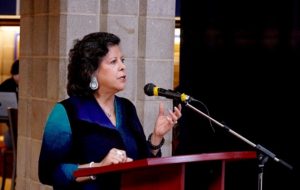‘We need Indigenous students to understand that they have more choice,’ says Cynthia Wesley-Esquimaux

By Rick Garrick
THUNDER BAY—Chippewas of Georgina Island First Nation’s Cynthia Wesley-Esquimaux spoke about reconciliation and the opportunity for employers to make a positive change during Lakehead University’s Aboriginal Initiatives Career Expo on April 3.
“Reconciliation is a very personal thing,” says Wesley-Esquimaux, chair on Truth and Reconciliation at Lakehead University. “There’s a lot of people that come to me and say ‘Well, if we are going to do this, what do we do? What should we be doing? What kind of action should we be taking?’”
Wesley-Esquimaux says talking more effectively when children are around about good relationships and being accepting of people around you and understanding that everyone has a culture is a way towards reconciliation.
“Because your kids are going to grow up with a better attitude about the people around them,” Wesley-Esquimaux says.
Wesley-Esquimaux says there will be no reconciliation without equity, without respect and without acceptance and acknowledgment of past transgressions.
“It’s going to be really important to understand the whole question of stewardship of these lands,” Wesley-Esquimaux says. “Canada, like every other country in the world, is on the edge of climate change. There is a lot going on, garbage overwhelming everything, so we have to start thinking about how we are going to do this together.”
The Career Expo, held in The Agora, was primarily aimed at Indigenous students, but all students were welcome to attend.
“We want to showcase all of the different kind of industries that are available to students for work and for careers,” Wesley-Esquimaux says. “We are also having some workshops so they can actually look at how do you build a resume that is going to get people’s attention, how do you do an interview so that when you go into that room people are going to be intrigued by what you have to offer.”
Wesley-Esquimaux says some Indigenous students have a limited vision of what careers or fields are available to them.
“Because they live in small communities, they know policing, they know teaching, they know nursing,” Wesley-Esquimaux says. “But all of those industries represent a huge amount of different kinds of jobs — that’s what we need to be talking about. We need Indigenous students to understand that they have more choice than is obvious to them. So one of the things we do through the Aboriginal Initiatives Office is we ask all of the professors to come in and talk about their particular course.”
A variety of workshops were also presented to the students by local employment agencies, including Career Planning, Creating a Social Media Presence, Job Search Skills, Social Science Workshop, Employer Expectations and Protocols and Rights.
“It’s a little bit different than your typical career fair,” says Lakota Williams, a third-year Sociology student and one of the organizers of the expo. “It’s more interactive so people can learn or refine their employability skills.”
Lisa Harris, coordinator of the Aboriginal Mentorship Program within the Office of Aboriginal Initiatives at Lakehead University, says the businesses that are stepping forward to make changes and hire Indigenous students are making an effort towards truth and reconciliation.
“Throughout the city there are a lot of people who are anxious to hire not only our graduates [but also our] summer students,” Harris says. “The vendors were incredibly excited to be here because finding Indigenous graduate students in particular is sometimes tough. They get snapped up super quick in jobs, so they were very excited to be here and to hopefully maybe do some hiring today.”


